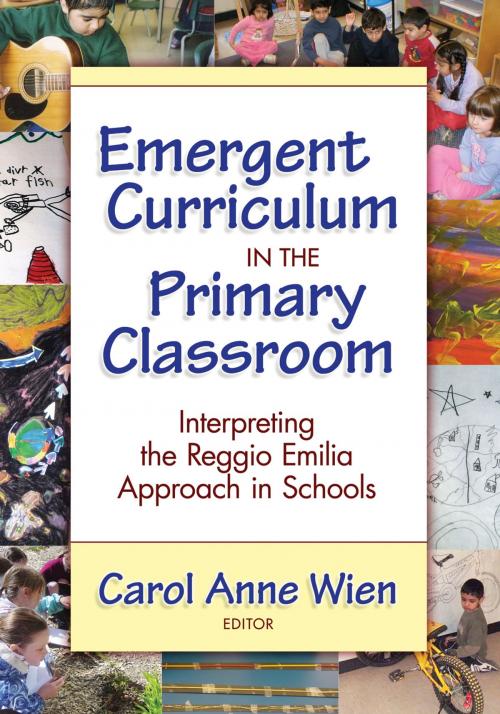Emergent Curriculum in the Primary Classroom
Interpreting the Reggio Emilia Approach in Schools
Nonfiction, Reference & Language, Education & Teaching, Educational Theory, Curricula, Preschool & Kindergarten| Author: | Carol Anne Wien | ISBN: | 9780807773680 |
| Publisher: | Teachers College Press | Publication: | December 15, 2009 |
| Imprint: | Language: | English |
| Author: | Carol Anne Wien |
| ISBN: | 9780807773680 |
| Publisher: | Teachers College Press |
| Publication: | December 15, 2009 |
| Imprint: | |
| Language: | English |
How is a compelling, exemplary curriculum created in schools in spite of the pressures to implement a standardized one? In this book, teachers and principals share their experiences with emergent curriculum, and with the creative practices they’ve developed in urban classrooms kindergarten to 3rd grade. We learn what they were trying to do, how they began the process, the challenges they faced, the decisions they made, and what happened to the children. All chapters are written by teachers who have found ways of interpreting the Reggio approach to enrich their teaching within the confines of traditional schools. This book is essential reading for anyone wishing to understand emergent curriculum and for all who hope to nurture an enlivening, energizing way to learn in classrooms. The inspiring stories presented here illustrate:
- Ways that early childhood values and practices have been sustained and promoted in elementary schools.
- Exemplary teaching practice, where children want to learn and teachers want to teach.
- How the influence of the Reggio Emilia approach is reaching into urban public school environments with diverse populations.
- Democratic participatory teaching that offers visions of responsible citizenship for children.
“This book is a treasure trove of useful frameworks, wonderful teacher stories, and memorable insights. It demonstrates the remarkable potential of children and teachers, and it clarifies how North American elementary school educators can take hold of ideas from Reggio Emilia and integrate them with their own ideals and standards.”
—Carolyn Pope Edwards, University of Nebraska–Lincoln
“Carol Anne Wien demonstrates again that she can illustrate complex ideas—this time the theories underlying the Reggio Emilia approach—in innovative ways for a broad audience.”
—Celia Genishi, Teachers College, Columbia University
“A must read for educators seeking an antidote to prescriptive curricular practice that respects neither children nor teachers.”
—Curt Dudley-Marling, Lynch School of Education, Boston College
“This book provides long overdue and compelling pathways for extending Reggio Emilia principles into the primary grades. It will encourage readers to feel their way into the spirit and substance of emergent curricula and come away rejuvenated.”
—Daniel Scheinfeld, Erikson Institute, Chicago, Illinois
How is a compelling, exemplary curriculum created in schools in spite of the pressures to implement a standardized one? In this book, teachers and principals share their experiences with emergent curriculum, and with the creative practices they’ve developed in urban classrooms kindergarten to 3rd grade. We learn what they were trying to do, how they began the process, the challenges they faced, the decisions they made, and what happened to the children. All chapters are written by teachers who have found ways of interpreting the Reggio approach to enrich their teaching within the confines of traditional schools. This book is essential reading for anyone wishing to understand emergent curriculum and for all who hope to nurture an enlivening, energizing way to learn in classrooms. The inspiring stories presented here illustrate:
- Ways that early childhood values and practices have been sustained and promoted in elementary schools.
- Exemplary teaching practice, where children want to learn and teachers want to teach.
- How the influence of the Reggio Emilia approach is reaching into urban public school environments with diverse populations.
- Democratic participatory teaching that offers visions of responsible citizenship for children.
“This book is a treasure trove of useful frameworks, wonderful teacher stories, and memorable insights. It demonstrates the remarkable potential of children and teachers, and it clarifies how North American elementary school educators can take hold of ideas from Reggio Emilia and integrate them with their own ideals and standards.”
—Carolyn Pope Edwards, University of Nebraska–Lincoln
“Carol Anne Wien demonstrates again that she can illustrate complex ideas—this time the theories underlying the Reggio Emilia approach—in innovative ways for a broad audience.”
—Celia Genishi, Teachers College, Columbia University
“A must read for educators seeking an antidote to prescriptive curricular practice that respects neither children nor teachers.”
—Curt Dudley-Marling, Lynch School of Education, Boston College
“This book provides long overdue and compelling pathways for extending Reggio Emilia principles into the primary grades. It will encourage readers to feel their way into the spirit and substance of emergent curricula and come away rejuvenated.”
—Daniel Scheinfeld, Erikson Institute, Chicago, Illinois















